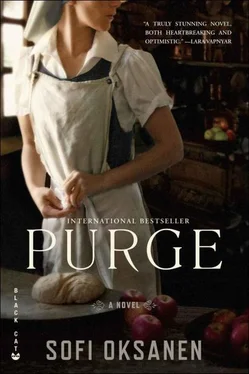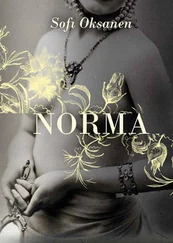She found a little bag in the middle of one of the piles. Martin’s old tobacco pouch. It had old gold coins and gold teeth in it. A gold watch, with Theodor Kruus’s name engraved on it. Her sister Ingel’s brooch, which had disappeared that night in the basement of town hall.
Aliide sat down on the floor.
Martin hadn’t been there. Not Martin.
Although Aliide’s head had been covered and she hadn’t really been able to see anything, she still remembered every sound, every smell, every man’s footsteps from that basement. None of them belonged to Martin. That’s why she had accepted him.
So how did Martin come to have Ingel’s brooch?
The next day Aliide took the bicycle down the road into the woods. When she was far enough away, she left the bike by the side of the road, walked out toward the swamp, and threw in the pouch, in a great arch.
Läänemaa, Estonia
Pasha’s Car Is Getting Closer and Closer
Zara rinsed the last raspberries of the year, picked out the worms, threw out the ones that were completely wormeaten, trimmed the half-eaten ones, and tipped the cleaned berries into a bowl. At the same time she tried to figure out a way to ask Aliide about the rocks hitting the window, the “ tibla ” written on the door. At first Zara had been startled, thinking that it referred to her, but even her stumbling intellect told her that Pasha and Lavrenti wouldn’t take up that kind of game. It was intended for Aliide, but why would someone harass an old woman that way? How did Aliide manage to remain calm at a time like that? She was puttering away at the stove like nothing had happened, even humming, nodding approvingly at Zara’s bowl of berries now and then, and shoving a ladleful of foam skimmed from the boiling pot of jam into Zara’s hand. It seemed Talvi had always begged to be the first to have some. Zara started to empty the ladle obediently. The sweetness of the foam made her teeth twinge. Worms moved around on top of the discarded berries and made the bowl’s enameled flowers come alive. Aliide was unnaturally calm. She sat down on a stool next to the stove to watch the soup, her walking stick leaning against the wall. The swatter rested in her arms, and she used it now and then to slap at the occasional fly. Her galoshes gleamed even in the dark of the kitchen. The sweet scent that rose from the cooking pots mixed with the drying celery and the smell of sweat brought on by the heat of the kitchen. It muddled Zara’s brain. The scarf, which was drooping onto her neck, smelled like Aliide. It was difficult to breathe. New questions kept coming up, even though she hadn’t yet got any answers to her first ones. How did Aliide Truu live in this house? What did the rocks that hit the window mean? Would Talvi get here before Pasha did? Zara fidgeted impatiently. The roof of her mouth was sticky. Aliide hadn’t had much to say since she gave her explanation for the scrawlings on the door and the rain of stones, and it was torture. How could Zara get her babbling about her troubles again? Aliide had been angry when they talked about the rise in prices-maybe she should ask her about that. Was it a safe subject? The price of eggs nowadays, or soup bones? Or sugar? Aliide had muttered that she should start growing sugar beets again, the way things are now. But what could Zara ask her about it? Over the past year she had forgotten all the normal ways of being with people- how to get to know a person, how to have a conversation- and she couldn’t think of a segue to break the silence. Besides, time was running out and Aliide’s imperturbability scared her. What if Aliide was crazy? Maybe the stones and windows didn’t mean anything for Zara’s purposes; maybe she should just concentrate on doing something-and quickly. The raspberry seeds wedged between her teeth and wrenched at their roots. She could taste blood in them. The clock ticked metallically, the fire burned one stick of wood after another, the baskets of berries emptied, Aliide skimmed the foam and the worms that rose to the top with lunatic precision, and Pasha came closer. Every single minute he was getting closer. His car wouldn’t break down, and it wouldn’t run out of gas, and it wouldn’t be stolen-those kinds of things, delays that mere mortals experienced, didn’t happen to Pasha, because the problems of ordinary people didn’t touch him, and because Pasha always got his way. You couldn’t depend on Pasha having bad luck. He didn’t have bad luck. He had money luck, the only good kind, and he was getting inexorably closer.
Zara’s eye didn’t latch on to anything in the house, no old photographs, no books or inscriptions. She had to think of something else. The photo was there in her pocket.
Aliide went to get some jar lids from the pantry, and
Zara decided to act.
Berlin, Germany
The Photograph That Zara’s Grandmother Gave Her
In the photograph, two young girls are standing side by side and staring at the camera but not daring to smile. Their dresses fall over their hips slightly askew. The hem of one of them is higher on the right than on the left. It may have been ripped. The other one is standing up straighter, and she has a high bust and a slim waist. She’s placed one foot assertively ahead of the other so that its slender form, cloaked in a black stocking, would show well in the picture. There is some kind of badge on the breast of her dress, a four-leafed clover. It wasn’t clearly visible in the photo, but Zara knew that it was a badge from a rural youth organization, because her grandmother had told her about it. And as Zara looked at the photo now she saw something that she hadn’t understood before. There was something very innocent in the girls’ faces, and that innocence shone out at her from their round cheeks in a way that embarrassed her. Maybe she hadn’t noticed it before because she herself had worn the same expression, the same innocence, but now that she had lost it, she could recognize it in their faces. The expression of someone unacquainted with reality. The expression of a time when the future still existed and anything was possible.
Her grandmother had given her the photo before she left for Germany. In case anything happened to her while Zara was away. All kinds of things can happen to old people, and if anything did happen, the photo would already have a head start; it would save Zara the time it took to come and get it. Zara had tried to talk her out of it, but she wouldn’t give the idea up. Zara’s mother thought that anything old was trash, so she wouldn’t save any old pictures. Zara had nodded-she knew that side of her mother -and taken the photo and kept it, even when it was practically impossible, and she would keep it from now on; even if everything else she owned was lost and the shirt on her back belonged to Pasha, she would keep that picture, even if there was nothing in her body that she could call her own, if all her bodily functions depended on Pasha’s permission, even if she couldn’t go to the toilet without Pasha’s permission, or use a tampon or a wad of cotton or anything, because Pasha thought they were too expensive.
In addition to the photograph, her grandmother had given her a card with the address of the place where she was born written on the back, the name of the village and the house. Oak House. In case, on her great world travels, Zara should find herself in Estonia. The idea had surprised her, but it seemed self-evident to her grandmother.
“Germany’s right next to Estonia! Go and see it, now that you have a chance to do it so easily.”
Her grandmother’s eyes had lit up when she told her she was going to work in Germany. Her mother hadn’t been enthusiastic. She was never enthusiastic about anything, but she particularly didn’t like these plans; she thought the West was a dangerous place. The high pay didn’t change her opinion. Her grandmother didn’t care about the money, either, instead insisting that she use the money to visit Estonia.
Читать дальше












